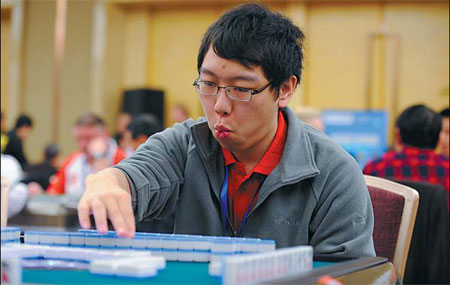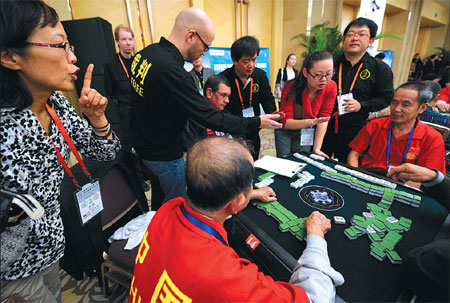Mahjong's magic casts a growing spell
Updated: 2012-10-31 08:09
By Wang Huazhong (China Daily)
|
|||||||||||
Healthy and friendly
Deng Kunming, deputy director of the public security bureau of Qianjiang, who provided security for the opening ceremony of mahjong championship, said the official perception of the game has changed: "After the event, I heard local policemen talking about mahjong's advantages in aiding communication skills. I sensed a change in their attitudes. A healthy mahjong culture in China could also relieve pressure on the police when maintaining social security."
 |
|
Tu Shaobo, a student at the Communication University of China, at the 3rd World Mahjong Championships, which attracted college students from across the country. Ran Wen / for China Daily |
However, Jiang Xuanqi, general secretary of the World Mahjong Organization, said support from police was not forthcoming when he organized matches many years ago.
In 1998, the General Administration of Sport of China published the paper Competition Rules of Chinese Mahjong, which prompted many enthusiasts to believe that nationwide leagues might come into existence because an official standard had been established.
However, negative perceptions of the game sparked outrage among the public, many of whom felt the leagues would result in adverse social consequences.
Nowadays, the game is less controversial, although discussions still rage far and wide whenever the media reports the opening of the championships, especially if students from elite institutions such as Tsinghua and Peking universities, are enrolled as competitors.
"The opening-up of China to the outside world has driven the healthy evolution of mahjong over the years. People have rethought the world and their values from a different angle," said Jiang. "However, we still have a long way to go to raise public awareness that mahjong can be a healthy, scientific and friendly mental game."
Chairman Mao Zedong once said the game was one of three treasures China had given the world, the others being Chinese traditional medicine and the classic novel A Dream of Red Mansions.
Both the former Sports Minister Li Menghua and the former Vice-President of the Chinese Academy of Social Sciences Yu Guangyuan have stressed the urgency of promoting mahjong as a force for social good and ensuring that it isn't just seen as a game, like martial arts.
"Anything can be used for good and bad causes and it is up to the government and social groups to direct opinion," said Jiang. "Engaging the younger generation is the key to realizing our goal," he said.
In recent years, a number of competitive clubs have registered with local authorities to promote the game, and young people's participation is "a major force that keeps the clubs running vibrantly".
Zhou Guijun, founder of the Beijing Fangzhuang Mahjong Mind Club, said young people are smart, skillful, innovative and most important, have energized the club.
The club has 100 members, aged from 20 to 80, every season, and to keep younger members involved Zhou has arranged for games to be scheduled at times convenient for them, because it would not survive without their input.
"After all, it's the young people who will restore the culture and image of mahjong," she said.
Zhang Shirong, 39, a math teacher in Qianjiang, said he welcomed the championships and supported the idea of introducing mahjong to students.
"Mahjong is a mind game and part of Chinese culture," Zhang said. "I don't see anything wrong if children play it to develop their mental abilities."
Business chances
Behind the growing acceptance and popularity, there is a prospective industry that could even match the market value of soccer in China, if unleashed.
The game brought hundreds of players, organizers and entertainers to stay and spend at the most expensive hotel in town, while food and beverage companies set up stalls around the events. More importantly, the local government is joining in too.
 |
|
More than 180 players from 13 countries participated in the 3rd World Mahjong Championships, held in the Qianjiang district of Chongqing this week. Ran Wen / for China Daily |
Officials from the Qianjiang government have proposed that the WMO should establish a museum and co-found an institute to research Qianjiang's mahjong culture, according to Jiang.
Wu Zhong, head of the Qianjiang district government, said the championships helped to promote tourism in the remote, mountainous southwestern region where infrastructure development has been slow. He pointed out that highways linking the district with the outside world were only built a few years ago.
He added that he has no concerns that negative perceptions of the game will tarnish the image of his government: "It's just a game, a leisure pursuit. Healthy culture is a good way of building our brand and encouraging more people to visit Qianjiang."
Qianjiang is not the only government "bold" enough to embrace the popularity of what is probably the most-widely played game in China. In August, more than 300,000 people attended a competition organized by a chess and card games association in Chengdu, Sichuan province.
Rui Quanbao, director of the mahjong professional committee under the Sports Association for Elders in the Xinjiang Uygur autonomous region, and Zhang Demin, chairman of the Jingzhou Association for Mahjong Sports Competition in Hubei province, said local governments are no longer wary of holding this type of event - instead they are in fierce competition to host competitions.
Some authorities have even pledged to sponsor the travel and accommodation costs if associations can assemble the requisite number of participants, said Rui.
For Liang Jianguo, the game's allure is simple: "You make friends through this game."
Contact the reporter at wanghuazhong@chinadaily.com.cn
Related Stories
World mahjong championship held in Chongqing 2012-10-29 17:33
Women wins 250,000 yuan in mahjong competition 2012-08-20 18:28
Rich businesswomen seek spouses who will tolerate mahjong 2012-06-26 21:32
Today's Top News
President Xi confident in recovery from quake
H7N9 update: 104 cases, 21 deaths
Telecom workers restore links
Coal mine blast kills 18 in Jilin
Intl scholarship puts China on the map
More bird flu patients discharged
Gold loses sheen, but still a safe bet
US 'turns blind eye to human rights'
Hot Topics
Lunar probe , China growth forecasts, Emission rules get tougher, China seen through 'colored lens', International board,
Editor's Picks

|

|

|

|

|

|





